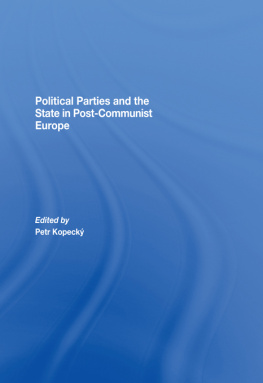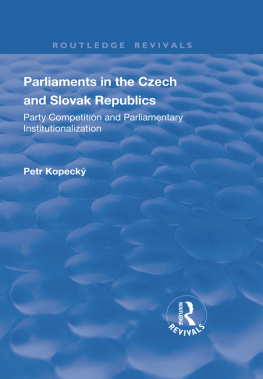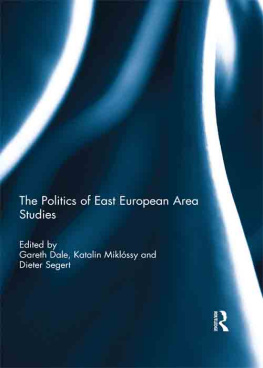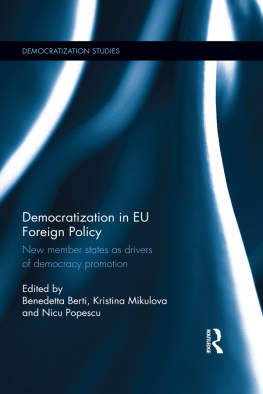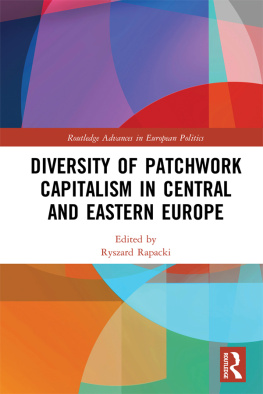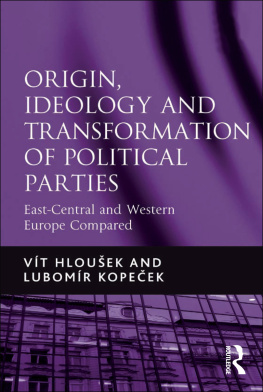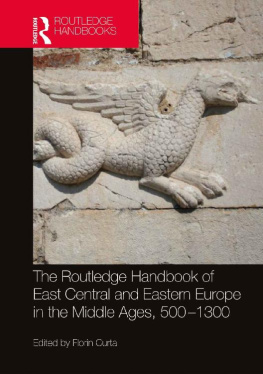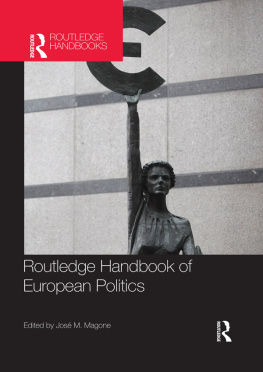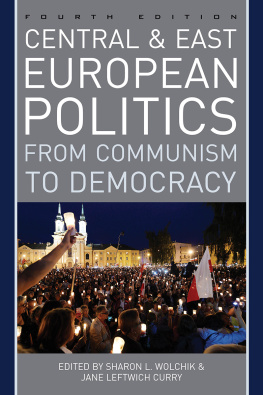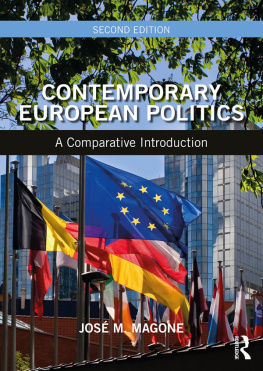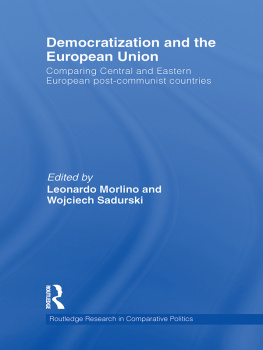First published 2018
by Routledge
2 Park Square, Milton Park, Abingdon, Oxon OX14 4RN
and by Routledge
711 Third Avenue, New York, NY 10017
Routledge is an imprint of the Taylor & Francis Group, an informa business
2018 selection and editorial matter, Adam Fagan and Petr Kopeck; individual chapters, the contributors
The right of Adam Fagan and Petr Kopeck to be identified as the authors of the editorial material, and of the authors for their individual chapters, has been asserted in accordance with sections 77 and 78 of the Copyright, Designs and Patents Act 1988.
All rights reserved. No part of this book may be reprinted or reproduced or utilised in any form or by any electronic, mechanical, or other means, now known or hereafter invented, including photocopying and recording, or in any information storage or retrieval system, without permission in writing from the publishers.
Trademark notice: Product or corporate names may be trademarks or registered trademarks, and are used only for identification and explanation without intent to infringe.
British Library Cataloguing-in-Publication Data
A catalogue record for this book is available from the British Library
Library of Congress Cataloging-in-Publication Data
A catalog record for this book has been requested
ISBN: 978-1-138-91975-4 (hbk)
ISBN: 978-1-315-68768-1 (ebk)
Typeset in Bembo
by Apex CoVantage, LLC
Jenny berg is a PhD student in Political Science at Dalarna University, Sweden.
Josephine T. Andrews is Associate Professor at the Department of Political Science, University of California at Davis, USA.
Florian Bieber is Professor of Southeast European Studies and Director of the Centre for Southeast European Studies at the University of Graz, Austria.
Sarah Birch is Professor of Political Science and Director of Research at the Department of Political Economy, Kings College London, UK.
Dorothee Bohle is Professor of Political Science at the Department of Political and Social Sciences, European University Institute, Italy.
Martin Brusis is Member and Principal Investigator of the Graduate School for East and Southeast European Studies at the Ludwig-Maximilian University of Munich, Germany.
Ondej Csa is Associate Professor at the Department of Sociology, Charles University, Czech Republic.
Kevin Deegan-Krause is Associate Professor of Political Science at the Department of Political Science, Wayne State University, USA.
Antoaneta L. Dimitrova is Associate Professor at the Institute of Public Administration, Leiden University, the Netherlands.
Grzegorz Ekiert is Lawrence A. Tisch Professor of Government and Director of the Center for European Studies at Harvard University, USA.
Zsolt Enyedi is Professor at the Department of Political Science, Central European University, Hungary.
Rachel A. Epstein is Professor at the Josef Korbel School of International Studies and Academic Co-director of the Colorado European Union Center of Excellence, University of Denver, USA.
Adam Fagan is Professor of European Politics and Head of the School of Politics and International Relations, Queen Mary University of London, UK.
James Hughes is Professor of Comparative Politics at the Department of Government, London School of Economics and Political Science, UK.
Petr Kopeck is Professor of Political Science and Director of Central and East European Studies Center, Leiden University, the Netherlands.
Tatiana Kostadinova is Professor of Political Science at the Department of Politics and International Relations, Florida International University, USA.
Jan Kubik is Professor of Slavonic and East European Studies and Director of the School of Slavonic and East European Studies, University College London, UK.
Martin Mendelski is Postdoctoral Researcher at Max Planck Institute for the Study of Societies, Germany.
Jan-Hinrik Meyer-Sahling is Professor of Political Science at the School of Politics and International Relations, University of Nottingham, UK.
Cas Mudde is Associate Professor at the Department of International Affairs, University of Georgia, USA.
Conor ODwyer is Associate Professor at the Department of Political Science and the Center for European Studies, University of Florida, USA.
Eva-Clarita Pettai is Senior Researcher at the Institute of Government and Politics, University of Tartu, Estonia.
Vello Pettai is Professor of Comparative Politics at the Johan Skytte Institute of Political Studies, University of Tartu, Estonia.
Andrew Roberts is Associate Professor at the Department of Political Science, Northwestern University, USA.
Richard Sakwa is Professor of Russian and European Politics at the School of Politics and International Relations, University of Kent, UK.
Thomas Sedelius is Associate Professor in Political Science at Dalarna University, Sweden.
Allan Sikk is Senior Lecturer in Comparative Politics at the School of Slavonic and East European Studies, University College London, UK.
Maria Spirova is Associate Professor of Comparative Politics and International Relations at the Institute of Political Science, Leiden University, the Netherlands.
Sherrill Stroschein is Senior Lecturer in Politics at the Department of Political Science, University College London, UK.
Frank C. Thames is Associate Professor at the Department of Political Science, Texas Tech University, USA.
Elsa Tulmets is Marie Curie Fellow at the Center for International Studies, Sciences Po Paris, France.
Peter Vermeersch is Professor of Political Science at the Centre for Research on Peace and Development, University of Leuven, Belgium.
Mark Webber is Professor of International Politics and Head of the School of Government and Society, University of Birmingham, UK.
Andrew Wilson is Professor of Ukrainian Studies at the School of Slavonic and East European Studies, University College London, UK.
26
NATO Enlargement and the Post-Communist States
Mark Webber
Introduction
The North Atlantic Treaty Organization (NATO), so the clich goes, was created to keep the Russians out, the Americans in and the Germans down (quote by Lord Ismay cited in Med-calf 2005: 3). This blunt (and probably apocryphal) characterisation conveys, nonetheless, an important meaning. NATOs overt purpose, to defend against a known adversary, has necessarily entailed transatlantic support and the co-option of continental Europes major power. In other words, as with all alliances, NATOs strength is in numbers. What is striking is by how much that number has increased. NATO has grown from an original twelve members to twenty-eight (likely to become twenty-nine in 2017). Growth, moreover, has occurred in the midst of other profound changes. Since the termination of the Cold War, the alliance has acquired a range of new functions. Collective defence has remained significant, but equal standing has also been given to two other core tasks: crisis management and cooperative security (NATO 2010: para. 4). NATO has thus seen action in places as far apart as the Balkans, Libya, and Afghanistan. All this, moreover, has been accompanied by an ongoing process of institutionalisation (standard-isation, defence planning, and command coordination), an emphasis on political solidarity, and creative efforts in the realm of doctrinal and strategic thinking.
None of this is to idealise NATOs recent (or, indeed, longer) history. The alliance has been troubled by internal division during all six decades of its existence. Questions have been regularly posed about the wisdom and efficacy of its operations, as well as the structural weakness occasioned by European dependency on American military power. NATO, nonetheless, has confounded expectations that its demise is imminent (Thies 2009: 124). Prognostications of collapse (or, at least, irrelevance) following the end of the Cold War, 9/11, or the 2003 Iraq crisis do not bear scrutiny when set against the reorientation of NATO purpose each of these historical watersheds occasioned. And while a certain scepticism of NATOs roles in Bosnia and Herzegovina, Kosovo, Libya, and Afghanistan may be justified, here NATOs defenders can still point to the alliances resilience in the face of demanding security challenges (Webber 2013: 2829). If, as Tetrais (2004; 139) has argued, permanent multinational alliances appear increasingly to belong to the past, then it is clear that NATO has bucked the trend. NATO has outlived its Cold War contemporaries (the Warsaw Pact, the Southeast Asia Treaty Organization, ANZUS, and the Western European Union), and has provided a framework of cooperative effort much more substantial than its putative postCold War rivals (the Russian-led Collective Security Treaty Organisation, for instance).


